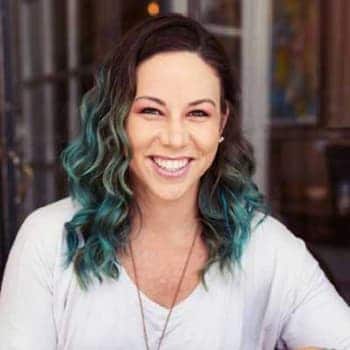Addiction led me down a very dark path, very quickly. Recovery led me to the best life possible — one filled with passion, integrity, fulfillment, and authenticity.
Donuts were my gateway drug.
My first rehab was for donuts: ‘fat camp.’ I spent over ten years going to a weight-loss summer camp for kids. I’d gain back the weight every year plus a little more, relapsing on cake, and repeating the cycle. I often ate my feelings.Food made me feel gooduntil it didn’t anymore. My use of food simultaneously hurt and comforted me. Growing up overweight and having problems with obesity all my life, I decided to go through gastric bypass surgery in my early twenties. I lost over 100 pounds and, when I could no longer use food to anesthetize and self-medicate, I turned to booze. I just traded one substance for another.
Although I was a late bloomer when it came to drinking alcohol, and I’ve never done illegal drugs, my addiction led me down a very dark path, very quickly. I lost jobs, relationships, and have had numerous legal problems as a result of my drinking.
Multiple charges ofdriving under the influenceresulted in a five-year state sentence — of which, I spent one whole year in prison. Amazingly, that wasn’t my rock bottom. They couldn’t incarcerate the addiction out of me. I ignored all of my underlying issues, which continued to build up over that time and intensified. Upon my release from jail, and while on parole supervision, I continued to drink. I violated parole when I received two public drunkenness charges, with a year left on my sentencing.
Ready to Break Free From Addiction?
If you’re seeking help for yourself or a loved one, our expert team is here to guide you every step of the way. Don’t wait—start your journey to recovery today.
My parole officer gave me a choice of going back to prison or checking myself into rehab. A day later, I drove myself drunk to therehab for inpatient treatmentwith a six-pack of beer in the trunk, just in case it didn’t work out. Always be prepared. (I was a girl scout after all.)
My last drink was that day: January 16th, 2011. That was the day I hit rock bottom, only because I decided to stop digging. I had to surrender and, although it was an ultimatum that got me there, I was ready. I entered full of self-doubt, dreading change, fearing failure, uncertainty, and alone. The only thing I knew for sure was that I no longer liked who I was, I was no longer myself, and I wasn’t who I was born to be.
My rock bottom didn’t involve the external consequences of my addiction; it was my internal feelings of inauthenticity that became my breaking point. It isn’t a coincidence that the AA medallion contains the phrase “To thine own self be true.” It was the deep feeling of shame that kept me in the darkness of my addiction. As I continued to plummet down the rabbit hole of alcoholism, I started to believe I was a bad person, weak and inadequate, undeserving of love and happiness. I continued to lie, cheat, and dodge my way through life as I drank, trying to avoidthe consequences of my drinkingand reinforcing my negative self-identity. Shame forced me into isolation. I was a failure and was certain there was no coming back from that. I was broken and hopeless.
What I wanted was to recognize myself again. I didn’t know this person I had become. I didn’t like her. I used to like myself, was proud of my accomplishments, and was surrounded by family and friends that would speak highly of me. I was caring to others, I was trustworthy, and I had a moral compass. My addiction stole all of that.
Twenty-eight days of inpatient treatment gave me a safe place tobegin my journey of wellness. Under professional supervision, I received the rightmedications for my physical and mental health. Counseling was paramount to dealing with my underlying issues and learninghow to better cope with lifeon life’s terms. Most of all, I wasn’t alone anymore. I had found a fellowship of awesome, smart, funny, caring people who happened to also be addicts like me. If I liked these people and didn’t judge them for their illness, then I could do the same for myself.
I learned that growth and empowerment require reflection and facing the frightening, ugly, hard and unbearable reality. To heal, I had to give myself to the pain. My transformation required real honesty. Eventually, I was able to find compassion and forgiveness for myself. You can’t build a foundation without the proper tools. And you need a strong foundation to succeed.

Inpatient treatment and outpatient therapy, coupled with sober support and working atwelve-step program, gave me thosetools to build that foundation in recovery. I am mentally, emotionally, physically, and spiritually the healthiest I’ve ever been in my adult life. Although I’m not perfect, I feel fully authentic. I embrace all that is me, everything I’ve been through has made me into everything I’ve become. The lotus flower can only grow in mud. I am better and more beautiful for what I have endured. I have gained wisdom through pain. Along with gaining compassion and a sense of gratitude, I have found a deep sense of purpose through my service to others. As a professional speaker and comedic performer, I share mystory of addiction and recoveryhoping to inspire others, to give some comfort, and to reduce negative stigma of addiction that hold so many back from seeking treatment.
Living my truth and owning my story has liberated me. I use my gifts of empathy, vulnerability, openness, humor, and honesty to turn my ‘mess’ into my message. I want others to know recovery is possible. Recovery has given me the best life possible —a life filled with passion, integrity, fulfillment, and authenticity. This life is only possible if I live one day at a time.
I didn’t need that six-pack in my trunk after all.
AuthorLiz Russois a comedian, speaker, and recovery advocate. She has been performing for over a decade and headlines regularly for comedy clubs, colleges, theaters, casinos, festivals, and events across the country.








